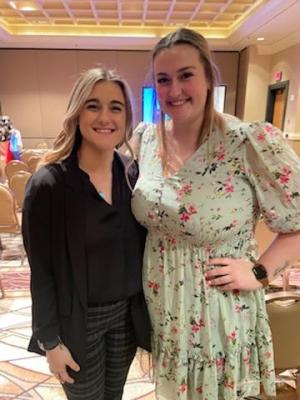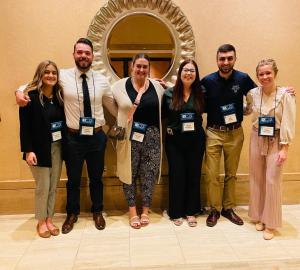Six Saint Anselm graduate students were given the opportunity to present their research and meet with educators and experts in the criminal justice field. Travelling to Las Vegas, Nev., for the Academy of Criminal Justice Sciences’ (ACJS) 59th Annual Meeting, students Casey Cavanaugh ’21 MA’22, Abigail Donaldson ’20 MA’22, Courtney Fisher ’21 MA’22, Kristina Mitchell ’20 MA’22, Kody Palladino ’21 MA’22, and Joseph Venuti ’21 MA’22 each presented their research at the conference, which was themed as “Avenues of Change: Integrating Research, Advocacy, and Education.”

Cavanaugh ’21 studied why individuals choose to refrain from engaging in criminal behavior, reasoning that plenty of others have asked the opposite question: why do people engage in criminal behavior? While at the conference, Cavanaugh had the opportunity to meet the director of UMass Lowell’s doctoral program for Criminology and Criminal Justice. “The day before I left, I got a call from the director. She said she would love for me to visit the campus, but she would be away at a conference for the week” Cavanaugh said. After the two figured out they would be attending the ACJS Conference, Cavanaugh was able to meet the director. “[She] introduced me to current students and many of her friends in the field…it made me really excited for what’s coming next!” Cavanaugh said.
Her paper, titled “How Higher Levels of Moral Development May Act as a Deterrent from Academic Dishonesty,” was written in collaboration with Dr. Kaitlyn Clarke of the Saint Anselm Criminal Justice Department and Joseph Venuti. “This topic is important because we are often seeking ways to explain why people commit crime. However, I think focusing on deterrence offers a more positive perspective” Cavanaugh said.
A survey was given to 64 Saint Anselm College students asking why they refrained from cheating. Responses were sorted into different stages of moral development; for example, those who refrained from cheating for fear of being caught were to stage one of moral development. The survey accounted for “whether opportunities for deviance can essentially override moral reasoning” which covers the transition to online learning during the Covid-19 pandemic.
Results of Cavanaugh’s research did not establish a significant relationship between moral development and academic dishonesty, which ran contrary to prior research suggesting a relationship between the two. However, this is not the end of her research. “I also met some folks who had ideas about some of the limitations of my own study who I will be citing in my final thesis, as well as some people who specialize in reentry, which is one of my primary interests,” Cavanaugh said.

Kody Palladino presented his research titled “Firearm Legislation and Its Impact on Firearm Induced Homicide Rates.” Palladino was proud to have presented at the conference. “Presenting at the ACJS Conference was not only an amazing opportunity, but a great experience…[it] enabled me to listen and observe diverse research from students and professor from a multitude of backgrounds” Palladino said.
In his research, Palladino sought to “identify a correlation between specific weapon type firearm legislation and specific weapon type induced homicide rates.” The research studied handguns, shotguns, and rifles, using correlative tests to determine differences in state firearm homicide rates and the total amount of laws governing these types of weapons. Using the Uniformed Crime Report and state firearm databases, Palladino found a pattern which suggested possible correlations between weapon type homicide rates and the total amount of firearm legislation employed in each state.
Joseph Venuti’s research, titled “The Effects of Weather on Crime”, studied how weather variables such as temperature and precipitation affect crimes rates for assault, larceny, and theft in cities around the U.S.
Venuti found presenting at the event to be an honor. “I was extremely happy to be able to represent the promising future of the new graduate program at Saint Anselm,” said Venuti. “It also gave me many opportunities to network, and although I am going into law enforcement, I was able to connect with researchers and professors who wanted to continue working on research or further education with me, as well as giving me ideas on how I could expand upon my current research, which I plan to continue after graduation.”
To cover all climates in his research, Venuti studied Boston, Seattle, Los Angeles, Houston, and New Orleans with data he and Professor Phil McCormack of the Criminal Justice Department gathered. With data ranging from 2000-2014, he found that temperature had the most significant effect on crime, while weather also had observable effects.
Venuti expressed optimism at his research, saying that while it was “only a start, [it] tries to begin the process of making a more standardized study [on weather] that can be performed worldwide to better inform policy and police so resources can be better deployed to serve the public, especially as climate change begins to make weather a more pertinent factor in our everyday lives.”
